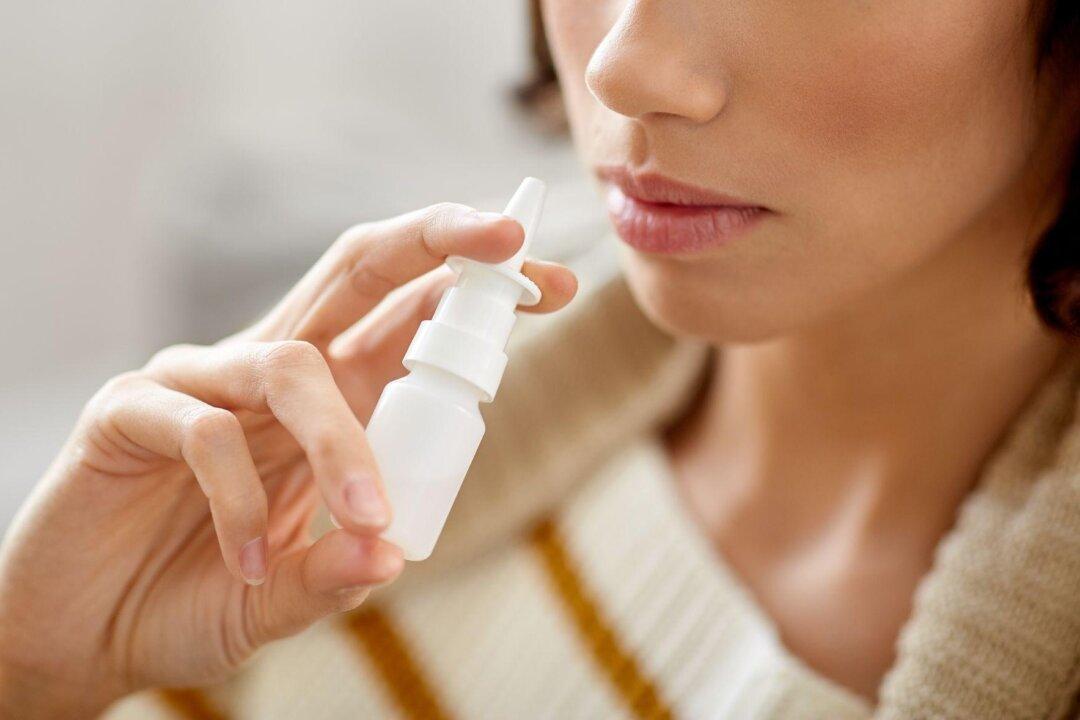
Yes, it is sort of time that someone actually studied those nasal sprays.
the first take home is just the act of hydrating or washing the nasal system is beneficial. Understand that all this while enclosed is also an external surface of the body. making blood based interventions problematic.
I have actually intervened with a saline wash which is commercially available and also have used very DILUTE hydrogen peroxide sprayed into my nose which worked well.
However a saline solution is ample to work all this. it also provides relief and now we know it shortens the problem down. It does not pretend to be a cure ,but it is certainly a lot better than nothing.
Nasal Sprays Can Be Effective in Preventing Lengthy Illnesses
Non-prescription medications prevent full-blown symptoms, study says.
A woman holds a nasal spray bottle. (Ground Picture/Shutterstock)
By Huey Freeman
7/13/2024Updated:7/14/2024
https://www.theepochtimes.com/health/nasal-sprays-can-be-effective-in-preventing-lengthy-illnesses-5685467?
A recent study involving almost 14,000 adults suggests that readily available nasal sprays are effective in shortening the impact of colds, flu, and other respiratory infections.
Recent evidence suggests that the use of “nasal sprays, or physical activity and stress management, could shorten the duration of respiratory infection,” the authors wrote in the study, published Thursday in The Lancet Respiratory Medicine.
“Effective, low-cost, non-prescription interventions are needed to reduce symptom burden and antibiotic use.”
The study was led by researchers at the University of Southampton.
Saline Sprays Prevent InfectionsThe research trials tested two nasal sprays—Vicks First Defence, a gel-based spray, and Sterinase, a saline liquid-based spray—and found that both reduced the length of time of illness by about 20 percent. Consequently, the research participants experienced a 20–30 percent reduction in time lost for work or other activities.
The authors said that the fact a saline rinse had the same effectiveness as a gel-based nasal spray suggested that the benefits observed were likely not due to the ingredients but due to the act of washing out the nasopharynx, which reduced the viral load.
The study was conducted to discover the effectiveness of nasal sprays, as well as physical activity and stress management, compared to other methods of overcoming respiratory illnesses. The researchers concluded that those methods not only reduced the duration of the infections, but also cut back the use of antibiotics as remedies.
“The important finding of a reduction in the use of antibiotics is also potentially very important in the fight against antibiotic resistance, one of the major public health threats of our time,” said professor Paul Little, a primary care researcher at the University of Southampton, in the press release.
Mr. Little, the overall leader of the trial, said the results are especially important to consider during the winter months, when there is a surge in infection rates.
“Given these results, our advice, particularly for those at higher risk from infections or those who get recurrent infections, is at the first sign of cough, sore throat, cold or flu like symptoms, use a nasal spray to prevent it from developing fully, and to use the sprays preventatively after close exposure to people with infections,” Mr. Little said.
Frequent Spraying Yields Best ResultsLucy Yardley, professor of health psychology at the University of Bristol and University of Southampton, said the frequency of use of nasal sprays played a key role in fighting infection.
“Our analysis suggests that the benefits were even greater when people used the sprays more often—we advised six times a day at the first sign of a cold—but many people in the study did not use the spray that often,” she said.
Upon joining the study, participants were recommended to use the spray six times daily with two sprays in each nostril after potential exposure to infection. However, most participants did not comply and still reaped benefits.
There were 13,799 adult participants, recruited from the practices of 332 primary care physicians in the UK. They were randomly selected to be treated with one of the sprays or to follow a regimen from an online resource promoting physical activity and stress management. Another group was randomly selected to receive usual care, which was brief advice about managing illness.
The participants who were steered to activity and stress management instead of the spray medication enjoyed just a 5 percent improvement in their time of return to health. However, the researchers said in their release that “this cost-effective option could have a significant impact on population terms given how easy it is to provide online advice to the general public.”
No comments:
Post a Comment